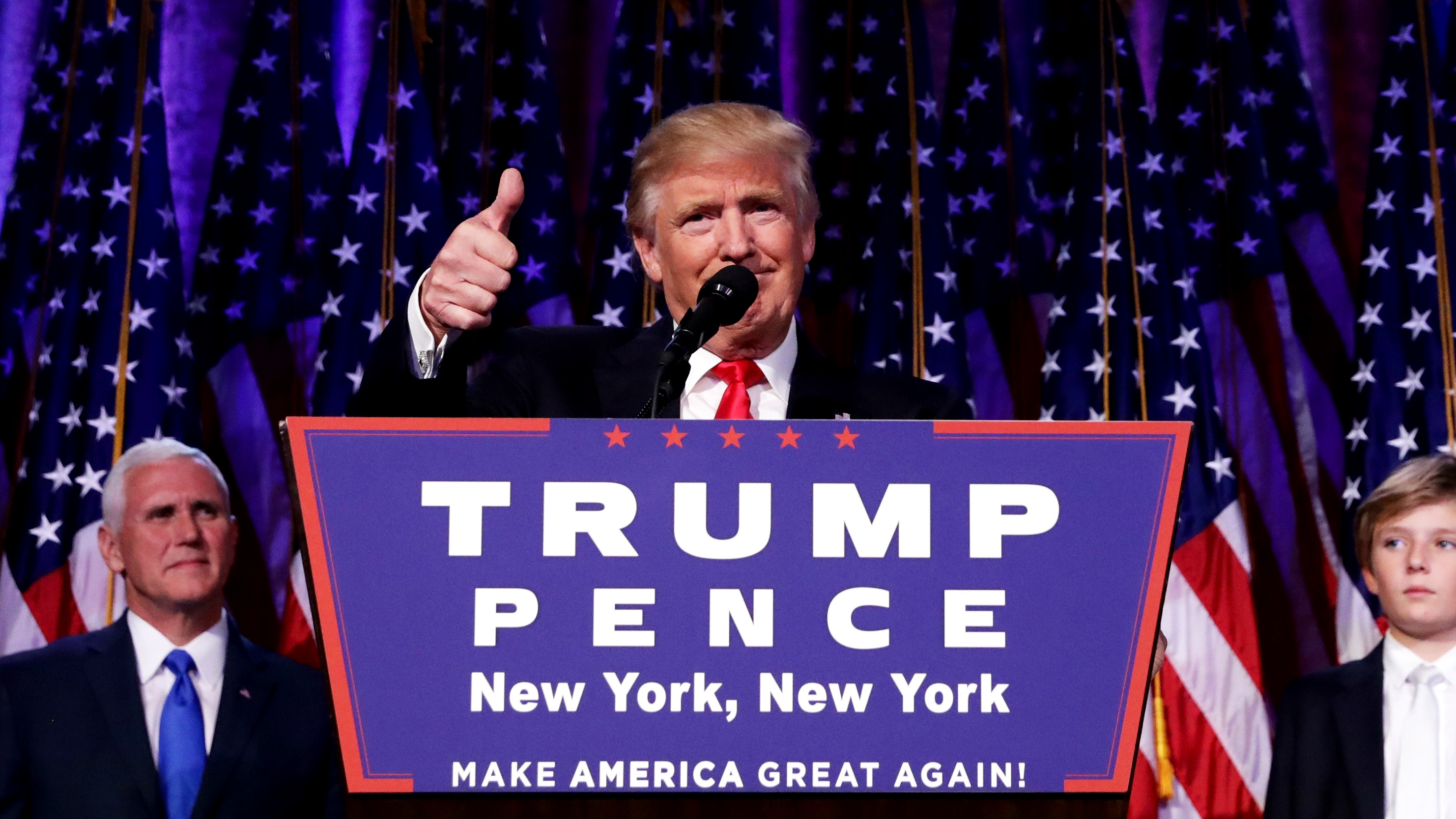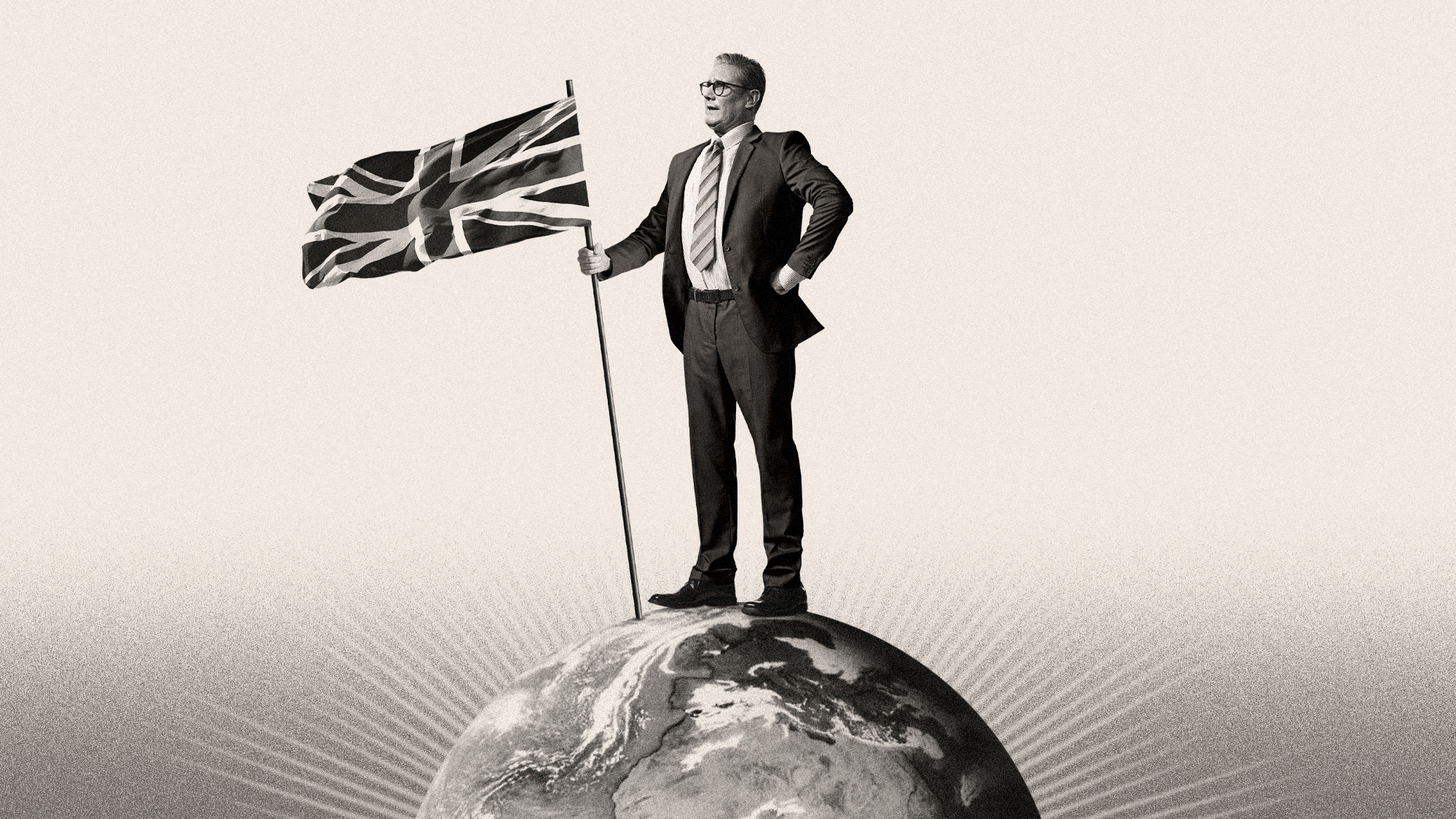What powers will Donald Trump have as US president?
Congress has significant checks on presidential power, but will Republican-dominated houses use them?

A free daily email with the biggest news stories of the day – and the best features from TheWeek.com
You are now subscribed
Your newsletter sign-up was successful
Donald Trump is to be the next president of the United States, after upending poll predictions to beat Democratic rival Hillary Clinton on election night.
While the president-elect receives his first briefings on his future role, the US and the global community are digesting the ramifications of the surprise result – particularly the powers he will now exercise as the "leader of the free world".
Is the US president the world's most powerful man?
The Week
Escape your echo chamber. Get the facts behind the news, plus analysis from multiple perspectives.

Sign up for The Week's Free Newsletters
From our morning news briefing to a weekly Good News Newsletter, get the best of The Week delivered directly to your inbox.
From our morning news briefing to a weekly Good News Newsletter, get the best of The Week delivered directly to your inbox.
On the face of it, yes. As president, Trump will be commander-in-chief of the world's most powerful military, and leader of a nation with a GDP of $18trn (£14.5trn).
On top of that, the former hotel magnate now has 2.7 million more people on the payroll, in the form of the nation's army of federal employees, and the ability to appoint 4,000 senior officials.
However, his greatest power comes in a non-descript briefcase. The black satchel, nicknamed the "nuclear football", contains the launch codes to activate the US's nuclear missiles and is carried by a top-level aide wherever the president goes.
Trump has said he would be prepared to use nuclear weapons as "an absolute last step", causing Clinton to question whether "a man you can bait with a tweet" should have ultimate authority over potentially world-ending weaponry.
A free daily email with the biggest news stories of the day – and the best features from TheWeek.com
However, while only the president can order the use of nuclear weapons, the order must be approved by the secretary of defence before it can be carried out.
How is the president's power limited?
US government is structured so power is shared across three branches: executive (the president), legislative (Congress - the House of Representatives and the Senate) and judicial (Supreme Court).
If a president does not agree with a bill approved by Congress, he or she has the power to veto it.
The presidential veto can be overridden by a two-thirds majority in the Senate; however this power is executed only rarely in practice.
Presidents have vetoed 1,506 bills and Congress has overridden only 111 of them, according to official records, the last time in September, when representatives overturned President Barack Obama's veto of a bill that would allow 9/11 victims' families to sue Saudi Arabia.
Congress's real power over the White House, however, lies in its control of the purse strings. In the mid-1990s, the federal government was forced to shut down for 28 days when the Republican-controlled Congress refused to approve Bill Clinton's budget.
However, Trump's position "will be vastly strengthened because his fellow Republicans retained control of the two houses of the US Congress," Al Jazeera reports.
In extreme cases of presidential misbehaviour, defined by the Constitution as "treason, bribery, or other high crimes and misdemeanours", the House of Representatives can vote to subject him or her to trial by the Senate, known as impeachment.
But although three have faced such proceedings - Clinton, Richard Nixon and Andrew Johnson - none has been sacked: Nixon resigned before the House could vote, while Johnson and Clinton survived their trials, if only by a single vote in the case of Johnson.
How do presidents get anything done?
Occasionally by simply ignoring the rules, as when Abraham Lincoln suspended the right of habeas corpus during the American Civil War. However, the most common route in modern times is through Executive Orders, presidential decrees with the force of law.
Pioneered by Theodore Roosevelt, they have been used to desegregate the US army (under Harry S Truman), ban the use of federal funds for abortion (under Ronald Reagan) and start an air war in Kosovo (under Clinton).
Congress can negate an Executive Order by passing legislation conflicting with it, although this could be subject to a presidential veto.
If an Executive Order is thought to conflict with the Constitution, it can be taken to the Supreme Court.
Although any Supreme Court judges nominated by Trump and passed by a Republican-dominated Congress are likely to be conservative, this does not necessarily mean special favours. Each individual be known for having "liberal" or "conservative" leanings, but their primary duty is to interpret and protect the rights guaranteed by the Constitution.
Could Trump declare war?
Under the US constitution, only Congress can declare war, although Republican Senator John McCain argued these powers are limited in practice as the nature of modern warfare rarely involves formal declarations between sovereign states.
Theoretically, military operations longer than 60 days require a congressional authorisation of force. However, several senators have expressed concerns about their imprecise and indefinite nature.
Democrat Tim Kaine said the congressional authorisation passed three days after 9/11 to target al-Qaeda and the Taliban "is being interpreted as a blank check to allow war without geographic limitation, without temporal limitation".
Since 2008, Kaine and McCain have been pushing a bipartisan bill that would compel the president to consult Congress before authorising any significant military action and for a congressional vote on the operation within 30 days.
Even with checks on using military force, Trump's power over foreign affairs will be "enormous and terrifying", says Jean Galbraith, an assistant professor at Penn Law.
A president can act without Congressional approval in "setting foreign policy priorities", "ordering some uses of force abroad" and – chilling news to those who welcomed the Paris climate change accords - "withdrawing the United States from most types of international agreements".
-
 Political cartoons for February 3
Political cartoons for February 3Cartoons Tuesday’s political cartoons include empty seats, the worst of the worst of bunnies, and more
-
 Trump’s Kennedy Center closure plan draws ire
Trump’s Kennedy Center closure plan draws ireSpeed Read Trump said he will close the center for two years for ‘renovations’
-
 Trump's ‘weaponization czar’ demoted at DOJ
Trump's ‘weaponization czar’ demoted at DOJSpeed Read Ed Martin lost his title as assistant attorney general
-
 The high street: Britain’s next political battleground?
The high street: Britain’s next political battleground?In the Spotlight Mass closure of shops and influx of organised crime are fuelling voter anger, and offer an opening for Reform UK
-
 Is a Reform-Tory pact becoming more likely?
Is a Reform-Tory pact becoming more likely?Today’s Big Question Nigel Farage’s party is ahead in the polls but still falls well short of a Commons majority, while Conservatives are still losing MPs to Reform
-
 Taking the low road: why the SNP is still standing strong
Taking the low road: why the SNP is still standing strongTalking Point Party is on track for a fifth consecutive victory in May’s Holyrood election, despite controversies and plummeting support
-
 What difference will the 'historic' UK-Germany treaty make?
What difference will the 'historic' UK-Germany treaty make?Today's Big Question Europe's two biggest economies sign first treaty since WWII, underscoring 'triangle alliance' with France amid growing Russian threat and US distance
-
 Is the G7 still relevant?
Is the G7 still relevant?Talking Point Donald Trump's early departure cast a shadow over this week's meeting of the world's major democracies
-
 Angela Rayner: Labour's next leader?
Angela Rayner: Labour's next leader?Today's Big Question A leaked memo has sparked speculation that the deputy PM is positioning herself as the left-of-centre alternative to Keir Starmer
-
 Is Starmer's plan to send migrants overseas Rwanda 2.0?
Is Starmer's plan to send migrants overseas Rwanda 2.0?Today's Big Question Failed asylum seekers could be removed to Balkan nations under new government plans
-
 Has Starmer put Britain back on the world stage?
Has Starmer put Britain back on the world stage?Talking Point UK takes leading role in Europe on Ukraine and Starmer praised as credible 'bridge' with the US under Trump